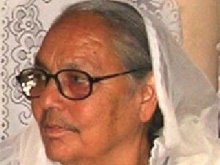Fighting Female Foeticide
Interview by Dr. Meeta Singh
 72 year old Sardarni Kuldeep Kaur has been
working tirelessly within the community to stop sex selective
abortions in Rajasthan. Her
work is a source of inspiration to all young women.
As a section of Punjab is celebrating the birth of the girl
child this Lohri, World Sikh News presents here an interview
with her by Dr. Meeta Singh, who heads
International Foundation of Electoral Systems’s Dignity of the
Girl Child programme in
Rajasthan, with the hope that many more Kuldeep Kaurs will
emerge to undo the harm done by the scourge of killing the girl
child.
72 year old Sardarni Kuldeep Kaur has been
working tirelessly within the community to stop sex selective
abortions in Rajasthan. Her
work is a source of inspiration to all young women.
As a section of Punjab is celebrating the birth of the girl
child this Lohri, World Sikh News presents here an interview
with her by Dr. Meeta Singh, who heads
International Foundation of Electoral Systems’s Dignity of the
Girl Child programme in
Rajasthan, with the hope that many more Kuldeep Kaurs will
emerge to undo the harm done by the scourge of killing the girl
child.
Meeta Singh: When did you first hear about the issue of female foeticide?
Kuldeep Kaur:Though I have been aware that sex selection and female foeticide do happen all around us, it was only at the Rajasthan University Women’s Association (RUWA) Workshop on 26 October 2005 that I really woke up to the issue. The film “Kukh Vich Katal” [Murder in the Womb] shown at the workshop left an indelible impact on my mind. The other speakers also highlighted the problem in a manner that I was quite shaken.
MS: Why did this issue resonate with you personally? Why did you
feel a need to get involved?
KK: That day the issue took me back in
time to my own childhood. I was a little girl; we lived in Ferozepur,
a small town in
Punjab.
My little sister was just born and a neighbor dropped in and asked
my father whether he would keep the girl or get rid of her. My
father was livid and asked the neighbor to leave and never mention
something like this ever again. He pampered us so much. I remember
that incident to this day. Somehow the workshop was the beginning of
a calling. A voice told me that I must do something. We can’t simply
allow our unborn daughters to die like this.
MS:
Why is female foeticide so prevalent in the Sikh community?
KK: I think Female Foeticide is a problem
with the Sikh community because of land holdings in the Punjab. The
smaller farmers do not want daughters because it means selling off
land to pay dowry; the bigger farmers do not want daughters because
they would rather have sons who will till the land than daughters
who will have to be married off. Also there is the question of
honor, bowing down before the groom’s family is hurtful to the ego.
Then the security of the girls is another problem.
MS: Tell me about the activities you are organizing in support of
the campaign against female foeticide.
KK: I started this campaign with the
women of the Sikh community in Jaipur. I formed ladies’ groups and
called them Samooh Stree Satsang [women’s group of
worshippers] with women who come regularly to the gurudwara [Sikh place
of worship].
MS: Where do these activities take place? What is the scope of your
activities so far?
KK: We have 20 gurudwaras in Jaipur so
we formed 20 groups in areas where the gurudwaras are located.
Every month, we have a meeting in one of the gurudwaras by rotation.
We sing hymns and religious songs, and we pray but between the hymns
we also discuss the problem of female foeticide. I tell the women to
discuss the issue in their own homes and neighborhoods and get as
many people as possible to sign oath papers saying they will never
indulge in female foeticide themselves, and they will never allow it
to happen. So far we have interacted with 1,780 people, of which 479
are men. We also invite speakers from outside to explain the issue.
We are trying to involve the men with the issue. We are working at
the district level and the state level but we do need to reach out
to the villages as well. We will need much more time for that.
My greatest challenge is to try and change mindsets. To keep working until female foeticide comes to an end.
The value and dignity of the girl child needs to be established. Dowry must stop, through laws, public opinion, whatever. Girls must get equal opportunities.
MS: Can you give me a specific example of how your work has been
received by a particular person, maybe another woman, community
leader or members of a particular community?
KK: Many important people who come to thegurudwara give me a
lot of respect for my work. One person who I would like to
especially mention is Sardar Jasbir Singh, who is the Chairperson of
the Minorities Commission in Rajasthan. He is interested in
sensitizing other minority communities on this issue as well. In Sri
Ganganagar, Timma and Harpreet, who are the youth leaders there,
have also been very enthusiastic in taking up the issue with the
Sikh community.
MS: What is the hardest part about your work?
KK: The hardest part…well, mobility is a
problem, and I am not getting any younger. Of course, changing
mindsets is never easy.
MS: Have you received criticism/threats for working on this issue?
KK: No, fortunately my community respects
me a lot and is quite appreciative of my work.
MS: Tell me about something that happened that inspired you to keep
working on this issue.
KK: I was invited to attend a national
consultation on female foeticide in Pune. It had been organized by
the Centre for Youth Development and Action and the United Nations
Population Fund. It was a national-level platform, but people there
listened to me carefully when I shared my experiences with them.
They asked me for my suggestions and gave me respect. That
recognition spurred me on to work harder. I was happy that so much
confidence had been reposed in me. I told them that Guru Nanak had
advocated social ostracism for people who kill their daughters.
My advice to younger women is that they must understand that women can change the world.
They need to discover their strength and power from within themselves and work together to break silences.
MS: What can people, both internationals and Indians, do to help
you?
KK: People at the international level as
well as Indians can do so much. Discuss the issue, hold conferences
and discussions—big and small. Don’t be afraid to talk about it,
condemn female foeticide when it happens, and try and stop it
whenever you can. Also, they can help with vocational training for
girls so that they can be economically independent.
MS: How did the idea of tying female foeticide to a wedding in
Sri Ganganagar come about?
KK: I had gone to Sri Ganganagar to
initiate the Samooh Stree Satsang there and to address a camp
of adolescent girls and sensitize them to the issue of female
foeticide. I also held meetings with the leaders of the Sikh Sangat
[community]. There, I learnt that a community wedding was in the
offing. I suggested that they could dedicate the event to the cause
of saving the girl child. My suggestion received a good response. I
also met with Timma and Harpreet, who I found very enthusiastic.
They were the main organizers and they took it forward from there. I
felt that if the couples would start their lives with a mindset that
condemns female foeticide, it would be helpful.
MS:
Did you attend the wedding? What do you remember most?
KK: Yes I did attend the wedding. What I
remember most is the collective oath that was administered by the
priests who performed the weddings to the newlywed couples and
nearly a thousand people present. This, I think, is significant
because people listen to the priests and holy men, and the
commitment becomes public so they become accountable in many ways.
When you commit in front of so many people, you can’t go and commit
sex selection and female foeticide so easily. What I also remember
is the way a woman of the Sikh community was honored. This woman had
decided to go against her husband and, at the cost of being
abandoned by him, did not agree to abort her baby girl, her third
daughter. This is a strong example of courage. And I am happy that
the Sikh community decided to honor her.
MS: Are there other weddings like this planned?
KK: Yes, we are planning a similar
community wedding in Jaipur. The date has not been decided yet. But
we have spoken with the Gianiji [Sikh priest] regarding
administering the oath against female foeticide, and he has agreed.
MS: Have there been opportunities to work with people from other
communities affected by female foeticide?
KK: Yes we have worked with other
communities, especially the Jains. The inter-community cell in RUWA
also brings together leaders from various communities once every few
months. We share our experiences, our problems and try and find
solutions. We also draw inspiration from one another. We all need to
work together if we have to stop female foeticide in this country
and give dignity to our daughters. RUWA is carrying forward what
they started almost two years ago.
MS:
What do people need to remember most about this issue and your work
in the Sikh community?
KK: What people need to remember about me
and my work is that they must STOP sex selection and female
foeticide. They need to remember that girls are to be valued, loved
and cared for and not killed in the womb.
MS: What is the state of women’s leadership in the NGO community and
broader Indian community?
KK: Women’s leadership is emerging. Girls
are very capable and do so well when they get opportunities. But
more women need to come forward. They need to provide support to
each other.
MS: What challenges do you face as a grassroots activist?
KK: My greatest challenge is to try and
change mindsets. To keep working until female foeticide comes to an
end.
MS: How can we have breakthroughs in the area of female foeticide?
KK: The value and dignity of the girl
child needs to be established. Dowry must stop, through laws, public
opinion, whatever. Girls must get equal opportunities. It is sad
when girls are thrown out of their marital homes for not bringing
dowry and subjected to violence. I feel pained [when I hear about
that].
MS: What advice would you offer to younger women?
KK: My advice to younger women is that
they must understand that women can change the world. They need to
discover their strength and power from within themselves and work
together to break silences. Even our scriptures say that ‘Why should
we talk ill of her, she who gives birth to kings?’”
